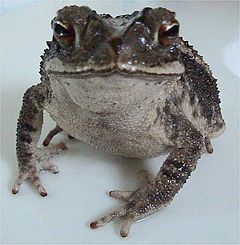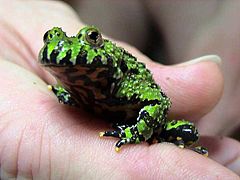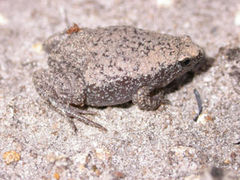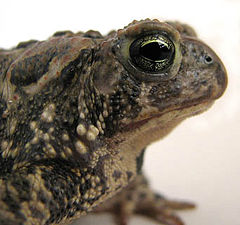Toad
2008/9 Schools Wikipedia Selection. Related subjects: Insects, Reptiles and Fish
| Toads | ||||||||
|---|---|---|---|---|---|---|---|---|
 Golden Toad, Bufo periglenes
|
||||||||
| Scientific classification | ||||||||
|
||||||||
| Families | ||||||||
|
At least 9, see article. |
Toad refers to a number of species of amphibians. A distinction is often made between frogs and toads by their appearance, prompted by the convergent adaptation among so-called toads to dry environments, which often entails a brown skin for camouflage which is also dry and leathery for better water retention. Many so-called toads also burrow, which requires further adaptations. However, these adaptations merely reflect the environment a species has adapted to, and are not reliable indicators of its ancestry. Since taxonomy reflects only evolutionary relationships, any distinction between frogs and toads is irrelevant to their classification.
For instance, many members of the families Bombinatoridae, Discoglossidae, Pelobatidae, Rhinophrynidae, Scaphiopodidae, and some species from the Microhylidae family are commonly called "toads". However, the only family exclusively given the common name "toad" is Bufonidae, the " true toads". Some " true frogs" of the genus Rana have also adapted to burrowing habits, while the species within the toad genus Atelopus are conversely known by the common name " harlequin frogs".
The type species of the family Bufonidae is the Common Toad, Bufo bufo, and around it cluster a large number of species of the same genus and some smaller genera. B. bufo is a tailless amphibian of stout build with a warty skin and any animal that shares these characteristics is liable to be called a toad, regardless of its location in formal taxonomy.
Almost all toads of the family Bufonidae have two lumps on either side of the back of their head, called the parotoid glands. These glands contain a poison, which oozes out if the toad is stressed. Some, like the Cane Toad Bufo marinus, are more toxic than others. Some " psychoactive toads" such as the Colorado River Toad Bufo alvaris, have been used recreationally for the effects of the bufotoxin, by either their skin secretions or eating boiled toads.
Taxonomy
|
Image:Frogy - close look.JPG
Southern Toad (Bufo terrestris)
|
True toads
Family Bufonidae ( Gray, 1825) - True Toads:
- Adenomus ( Cope, 1861)
- Altiphrynoides (Dubois, 1987)
- Andinophryne (Hoogmoed, 1985)
- Ansonia (Stoliczka, 1870)
- Atelophryniscus (McCranie, Wilson & Williams, 1989)
- Atelopus ( Duméril & Bibron, 1841)
- Bufo ( Laurenti, 1768)
- Bufoides (Pillai & Yazdani, 1973)
- Capensibufo (Grandison, 1980)
- Churamiti (Channing & Stanley, 2002)
- Crepidophryne ( Cope, 1889)
- Dendrophryniscus (Jiménez de la Espada, 1871)
- Didynamipus (Andersson, 1903)
- Frostius (Cannatella, 1986)
- Jameswoodisgaysin (Edward Yasmit-von burgen 1998)
- Laurenhryne (Tihen, 1960)
- Leptophryne ( Fitzinger, 1843)
- Melanophryniscus (Gallardo, 1961)
- Mertensophryne (Tihen, 1960)
- Metaphryniscus (Señaris, Ayarzagüena & Gorzula, 1994)
- Nectophryne (Buchholz & Peters, 1875)
- Nectophrynoides ( Noble, 1926)
- Nimbaphrynoides (Dubois, 1987)
- Oreophrynella ( Boulenger, 1895)
- Osornophryne (Ruiz-Carranza & Hernández-Camacho, 1976)
- Parapelophryne (Fei, Ye & Jiang, 2003)
- Pedostibes ( Günther, 1876)
- Pelophryne ( Barbour, 1938)
- Pseudobufo ( Tschudi, 1838)
- Rhamphophryne (Trueb, 1971)
- Schismaderma (Smith, 1849)
- Spinophrynoides (Dubois, 1987)
- Stephopaedes (Channing, 1979)
- Truebella (Graybeal & Cannatella, 1995)
- Werneria (Poche, 1903)
- Wolterstorffina ( Mertens, 1939)
Other toad families
Family Bombinatoridae ( Gray, 1825) - Fire-bellied Toads:
- Barbourula (Taylor & Noble, 1924)
- Bombina ( Oken, 1816)
Family Brachyctpoephalidae ( Günther, 1858) - Shield Toads:
- Brachycephalus ( Fitzinger, 1826)
Family Discoglossidae ( Günther, 1858)
- Alytes ( Wagler, 1830) - Midwife Toad
Family Microhylidae ( Günther, 1858)
- Subfamily Microhylinae - Narrowmouthed Toads:
- Gastrophryne ( Fitzinger, 1843)
Family Pelobatidae ( Bonaparte, 1850) - European Spadefoot Toads:
- Pelobates ( Wagler, 1830)
Family Scaphiopodidae ( Cope, 1865) - North American Spadefoot Toads:
- Scaphiopus ( Holbrook, 1836)
- Spea ( Cope, 1866)
Family Rhinophrynidae ( Günther, 1859) - Burrowing Toads:
- Rhinophrynus ( Duméril and Bibron, 1841)
Other
The Moche people of ancient Peru worshipped animals and often depicted toads in their art.
To Vietnamese people, toad is the uncle of the Sky. According to a Vietnamese ancient story, whenever toads grind their teeth, it is going to rain.
Superstition
It is commonly believed that if you touch a toad or if it urinates on you, that you will become infected with warts. This is in fact false. Warts are caused by an internal viral infection. Therefore, it is impossible for warts to be caused by an external source, such as a toad.
The paratoidal glands, which toads use to secrete poison for protection, are often mistaken for warts. This is what leads people to the false conclusion that toads give you warts.





